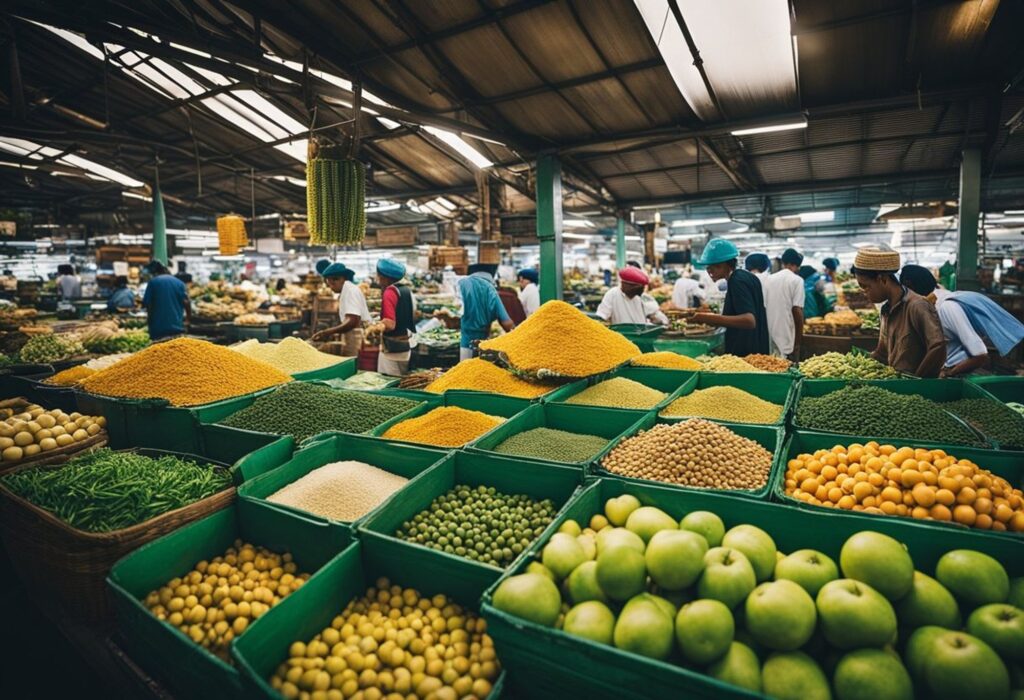Unlocking Opportunities: The Key Benefits of Sourcing in Indonesia
Indonesia has emerged as a top destination for businesses looking to source products and services. With a strategic location and access to ASEAN markets, a competitive labor market, and rich natural resources, Indonesia offers a range of benefits to companies looking to expand their operations. In addition, the government provides incentives and support for foreign investors, and the country’s growing infrastructure and cultural and economic stability further add to its appeal.
As a result, companies across diverse industries are turning to Indonesia for sourcing, manufacturing, and outsourcing. From furniture and home décor to gaming and technology, Indonesia offers a wealth of opportunities for businesses of all sizes. With success stories from companies that have already made the move to Indonesia, the country is quickly becoming a game-changer for sourcing and outsourcing.
Key Takeaways
- Indonesia’s strategic location and access to ASEAN markets, competitive labor market, and rich natural resources make it an attractive destination for businesses looking to source products and services.
- The government provides incentives and support for foreign investors, and the country’s growing infrastructure and cultural and economic stability further add to its appeal.
- Diverse industries, including furniture, home décor, gaming, and technology, are finding success in Indonesia, making the country a game-changer for sourcing and outsourcing.
Strategic Location and Access to ASEAN Markets
Indonesia’s strategic location in Southeast Asia makes it an ideal hub for businesses looking to expand their reach in the region. With a population of over 270 million and a rapidly growing middle class, Indonesia is the largest economy in Southeast Asia and the 16th largest economy in the world.
Indonesia is also a member of the Association of Southeast Asian Nations (ASEAN), a regional intergovernmental organization that promotes economic cooperation and integration among its ten member states. With a combined GDP of over $3.2 trillion and a population of over 600 million, ASEAN represents a significant market for businesses looking to expand their operations in the region.
Indonesia’s membership in ASEAN provides businesses with access to a vast and diverse market that includes some of the fastest-growing economies in the world. The ASEAN Free Trade Area (AFTA) also offers businesses tariff-free access to the region’s markets, making it easier and more cost-effective to do business in Southeast Asia.
Furthermore, Indonesia’s location on key shipping lanes and its proximity to major markets such as China, Japan, and South Korea make it an essential hub for regional supply chains. This has led to the development of a thriving supply chain landscape in Indonesia, with low-cost labor and favorable location being two of the critical strengths of the country’s supply chains.
In summary, Indonesia’s strategic location in Southeast Asia and its membership in ASEAN make it a game-changer for businesses looking to expand their operations in the region. With access to a vast and diverse market, tariff-free access to the region’s markets, and a thriving supply chain landscape, Indonesia is a strategic choice for businesses looking to grow their presence in Southeast Asia.
Competitive Labor Market

Indonesia’s labor market is highly competitive, with a skilled workforce that is well-equipped to handle various tasks. This is due to the country’s strong education system, which includes technical and vocational schools that produce highly skilled workers.
Skilled Workforce
Indonesia’s workforce is known for its technical expertise, particularly in the manufacturing and construction sectors. The country’s technical and vocational schools produce highly skilled workers who are trained to operate machinery and equipment, as well as to perform specialized tasks.
Moreover, Indonesia has a young population, with a median age of 30 years old. This means that the country has a large pool of young, talented workers who are eager to learn and grow in their careers.
Labor Costs
Indonesia’s labor costs are highly competitive, making it an attractive destination for businesses looking to lower their production costs. The country’s minimum wage is relatively low compared to other countries in the region, such as Singapore and Malaysia.
However, it is important to note that labor costs can vary depending on the region and industry. For example, labor costs in Jakarta, the capital city, are generally higher than in other parts of the country. Additionally, labor costs in the manufacturing sector tend to be lower than in the service sector.
In conclusion, Indonesia’s competitive labor market is a major advantage for businesses looking to source products from the country. With a skilled workforce and low labor costs, Indonesia offers businesses the opportunity to lower their production costs while maintaining high quality standards.
Rich Natural Resources

Indonesia is an archipelago nation located in Southeast Asia, with a population of over 270 million people. The country is known for its abundant natural resources, which have played a significant role in its economic growth over the years. In this section, we will discuss the rich natural resources that make Indonesia a game-changer in sourcing.
Commodity Abundance
Indonesia is rich in natural resources, which supports its manufacturing industries. The nation is a major supplier of commodities such as coffee, rubber, timber, palm oil, and cocoa to the world market. According to World Atlas, Indonesia is the world’s largest producer of palm oil, with an output of over 40 million tons per year. The country is also the second-largest producer of natural rubber in the world, with an annual output of over 3 million tons.
Moreover, Indonesia is blessed with fertile soils that support a variety of cash crops. The nation’s agricultural sector is one of the largest in the world, contributing significantly to the country’s GDP. The abundant availability of natural resources in Indonesia makes it an ideal destination for sourcing raw materials, especially for companies in the manufacturing and agricultural sectors.
Sustainable Sourcing
Indonesia is committed to sustainable sourcing practices, which have gained popularity in recent years. The government has implemented initiatives to promote sustainable sourcing practices, such as the Sustainable Palm Oil Certification System (ISPO) and the Indonesia Sustainable Ecosystem Foundation (ISEF).
The ISPO is a certification system that ensures palm oil production is carried out sustainably, while the ISEF promotes sustainable forestry practices. These initiatives aim to protect the environment and ensure that sourcing practices are sustainable for future generations.
In conclusion, Indonesia’s rich natural resources and commitment to sustainable sourcing practices make it an attractive destination for sourcing. Companies can benefit from the abundant availability of raw materials and the government’s initiatives to promote sustainable sourcing practices.
Government Incentives and Support

Tax Benefits
Indonesia offers a range of tax incentives to businesses looking to invest in the country. These include tax deductions, accelerated depreciation of fixed tangible assets, and fiscal loss compensation. The government has also expanded the pool of taxpayers who may receive tax benefits and loosened the criteria for receiving these benefits. For instance, corporations can now receive tax incentives for investing in research and development activities.
Ease of Doing Business
The Indonesian government has taken steps to improve the ease of doing business in the country. It has reduced more than 70 labor, tax, and other key laws to reduce bureaucratic inefficiencies, simplify business licensing requirements, and liberalize more industries for foreign investors. As a result, Indonesia has moved up 19 places in the World Bank’s Ease of Doing Business rankings since 2014.
Moreover, the government has established the Online Single Submission (OSS) system, which allows businesses to apply for all necessary licenses and permits through a single online platform. This has significantly reduced the time and cost of starting and operating a business in Indonesia.
In addition, the government has launched the Indonesia Investment Coordinating Board (BKPM), which serves as a one-stop-shop for investors looking to invest in Indonesia. The BKPM provides information on investment opportunities, helps investors navigate the regulatory framework, and assists with the application process for licenses and permits.
In conclusion, the Indonesian government has implemented a range of incentives and initiatives to attract foreign investment and improve the ease of doing business in the country. These measures have made Indonesia an attractive destination for businesses looking to expand their operations in Southeast Asia.
Growing Infrastructure

Indonesia has been investing heavily in its infrastructure in recent years, with a focus on improving transportation networks and technology advancements. These investments have made sourcing in Indonesia more efficient and cost-effective for businesses.
Transportation Networks
Indonesia has been expanding its transportation networks, including roads, railways, and ports, to better connect the country’s regions and improve logistics. The government has set a target to build 1,000 kilometers of new toll roads by 2024, which will help reduce transportation costs and improve delivery times for goods.
In addition, Indonesia has been investing in its airports, with plans to build several new airports and expand existing ones. This will help improve air cargo transportation and make it easier for businesses to import and export goods.
Technology Advancements
Indonesia has also been making significant advancements in technology, particularly in the areas of e-commerce and digital payments. The country has a large and growing population of internet users, which has created opportunities for businesses to sell products online and reach new customers.
Moreover, the Indonesian government has launched several initiatives to promote the growth of the digital economy, including tax incentives for tech startups and investments in digital infrastructure. These initiatives have helped attract foreign investment and create new jobs in the technology sector.
Overall, Indonesia’s growing infrastructure has made it an attractive location for businesses looking to source products from the country. With improved transportation networks and technology advancements, businesses can expect more efficient and cost-effective sourcing options in the future.
Cultural and Economic Stability

Indonesia is a country with a rich cultural heritage and a diverse population. The country has over 300 ethnic groups, each with its own language, customs, and traditions. This diversity has contributed to Indonesia’s cultural richness, and also to its political and economic stability. Despite its diversity, Indonesia has managed to maintain a strong sense of national unity, which has been instrumental in promoting economic growth and development.
Indonesia’s economy has been growing at a steady pace over the past few years. The country’s GDP is expected to reach $5.5 trillion by 2030, making it the fourth-largest economy in the world. This growth has been driven by a number of factors, including a large and growing middle class, a young and educated workforce, and a stable political environment.
Indonesia’s economic stability is also due in part to the government’s commitment to economic reform and investment in infrastructure. The government has launched a number of initiatives aimed at improving the country’s business climate and attracting foreign investment. These initiatives include tax incentives, streamlined regulations, and investment in infrastructure such as ports, highways, and airports.
Overall, Indonesia’s cultural and economic stability make it an attractive destination for businesses looking to source products and services. The country’s rich cultural heritage, diverse population, and stable political environment provide a solid foundation for economic growth and development. By investing in Indonesia, businesses can tap into a growing market with a young and educated workforce, while also contributing to the country’s economic development.
Opportunities in Diverse Industries

Indonesia’s manufacturing industry offers a wide range of opportunities across diverse sectors. From textiles and garments to automotive and electronics, the country’s skilled workforce, vast natural resources, and competitive pricing make it a popular destination for sourcing quality products.
Textiles and Garments
Indonesia’s textile and garment industry is one of the country’s largest and most important sectors. The industry employs over 3 million people and contributes significantly to the country’s GDP. With a long history of textile production, Indonesia has developed a skilled workforce and a strong supply chain for sourcing raw materials such as cotton, silk, and wool. The industry is also known for its traditional batik fabric, which is recognized as a UNESCO Intangible Cultural Heritage of Humanity.
Indonesia’s textile and garment industry has a competitive advantage in terms of cost, quality, and production capacity. The country’s strategic location also makes it an attractive destination for companies looking to diversify their supply chains. Some of the major textile and garment products manufactured in Indonesia include t-shirts, denim, sportswear, and formal wear.
Automotive and Electronics
Indonesia’s automotive and electronics industry is also growing rapidly, driven by increasing demand for consumer goods and infrastructure development. The country has a large pool of skilled workers and engineers, as well as a well-established supply chain for sourcing raw materials and components. Indonesia is also home to several major automotive and electronics manufacturers, including Toyota, Honda, Samsung, and LG.
The automotive industry in Indonesia is focused on producing low-cost, fuel-efficient vehicles for both domestic and export markets. The country has a competitive advantage in terms of labor costs and access to natural resources such as rubber and palm oil. The electronics industry in Indonesia is also expanding, with a focus on producing consumer electronics such as smartphones, laptops, and televisions.
Overall, Indonesia’s diverse manufacturing industry offers a range of opportunities for companies looking to source quality products at competitive prices. With a skilled workforce, strategic location, and established supply chains, Indonesia is a game-changer for companies looking to diversify their supply chains and tap into new markets.
Case Studies: Success Stories from Indonesia

Indonesia is a country with a growing economy and a thriving business environment. Many companies have found success in sourcing from Indonesia, and here are a few case studies that highlight their success stories.
Ajaib
Ajaib is an Indonesian stock trading platform that has seen rapid growth since its launch in May 2020. In October 2021, Ajaib announced that it had become a billion-dollar company after raising a $153 million round of funding. Ajaib now has over a million investors on its stock trading app and is one of the largest stock brokerages on the Indonesian Stock Exchange (IDX) in terms of trades. This success story is a testament to the potential of the Indonesian market for fintech companies.
Indonesia Cyber Education Institute
The Indonesia Cyber Education Institute (ICEI) is an organization that aims to bridge the digital skills gap in Indonesia. By 2030, Indonesia is expected to face a shortfall of nine million skilled professionals in digital skills. ICEI is working to address this issue by aligning education with industry demands for digital skills. This case study demonstrates the importance of investing in education and training to meet the needs of the growing economy.
Small Businesses and E-commerce
E-commerce has become increasingly important for small businesses in Indonesia, especially in the age of COVID-19. A recent study suggests that online businesses were more likely to survive the pandemic, and their profits rebounded more quickly. This success story highlights the resilience of small businesses in Indonesia and the potential of e-commerce to support their growth.
These case studies demonstrate the potential of sourcing in Indonesia and the success that companies have found in this market. From fintech to education and small businesses, Indonesia offers a range of opportunities for businesses looking to expand their sourcing options.
Frequently Asked Questions

What are the primary advantages of manufacturing in Indonesia?
Indonesia offers several advantages for manufacturers, including a large and growing labor force, competitive wages, and favorable tax policies. The country’s strategic location in Southeast Asia also makes it an attractive location for businesses looking to expand their operations in the region. Additionally, Indonesia has a diverse range of natural resources, which can be leveraged to produce a variety of goods.
How does Indonesia’s manufacturing landscape compare to other Southeast Asian countries?
Indonesia is one of the largest manufacturing hubs in Southeast Asia, and it is home to a diverse range of industries, including textiles, electronics, and automotive manufacturing. While other countries in the region, such as Vietnam and Thailand, have also emerged as major manufacturing centers, Indonesia’s large domestic market and strategic location make it a particularly attractive location for businesses looking to expand in the region.
What products are commonly sourced from Indonesia by international businesses?
Indonesia is known for its production of textiles, footwear, electronics, and automotive parts, among other products. In recent years, the country has also emerged as a major producer of renewable energy products, including solar panels and wind turbines. Additionally, Indonesia is home to a large and growing agricultural sector, which produces a variety of commodities, including palm oil, coffee, and rubber.
What should companies consider when choosing a sourcing agent in Indonesia?
When choosing a sourcing agent in Indonesia, companies should consider factors such as the agent’s experience and reputation, their knowledge of local markets and regulations, and their ability to negotiate favorable terms with suppliers. It is also important to ensure that the agent has a strong understanding of the specific product or industry being sourced, as well as the needs and requirements of the client.
How do Indonesia’s trade policies impact foreign sourcing and manufacturing?
Indonesia’s trade policies can have a significant impact on foreign sourcing and manufacturing. The country has implemented a number of protectionist measures in recent years, including import tariffs and restrictions on foreign investment in certain industries. However, Indonesia has also signed a number of free trade agreements with other countries and is a member of several regional trade blocs, which can provide opportunities for businesses looking to expand their operations in the country.
What are the logistical considerations for importing goods from Indonesia?
Importing goods from Indonesia can present a number of logistical challenges, including navigating complex customs regulations, ensuring compliance with local laws and regulations, and managing shipping and transportation logistics. It is important for companies to work with experienced logistics providers who have a strong understanding of the local market and can help to navigate these challenges.
Dive into the Benefits of Sourcing in Indonesia with Buyamia!
Unlock the advantages of accessing Indonesia’s vibrant market for premium-quality products. Learn how sourcing from Indonesia can streamline your supply chain, drive cost savings, and propel your business forward. Click here to explore Buyamia’s insights and revolutionize your sourcing approach today!

Leave a Reply